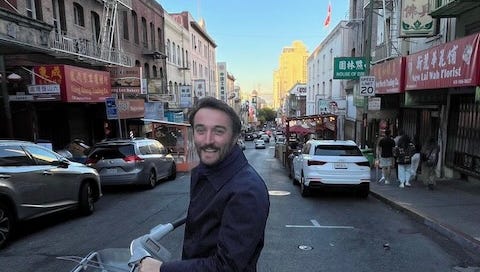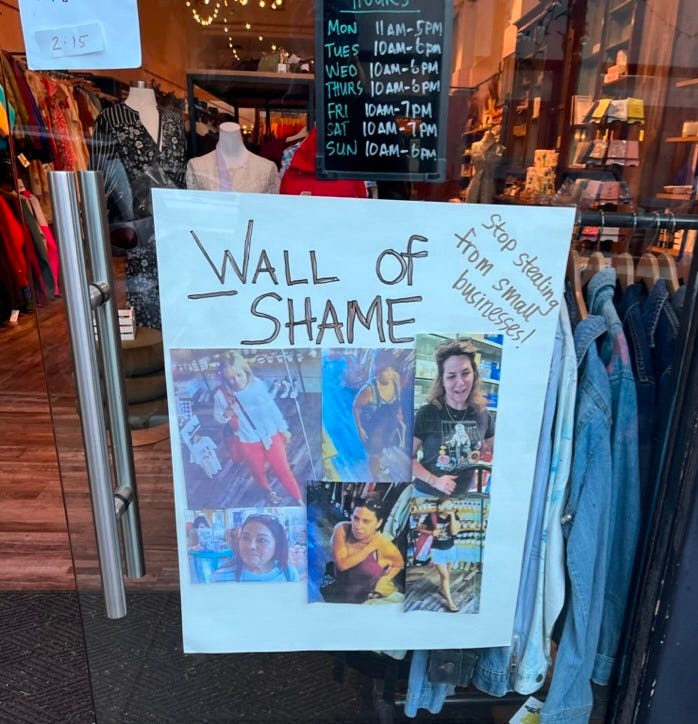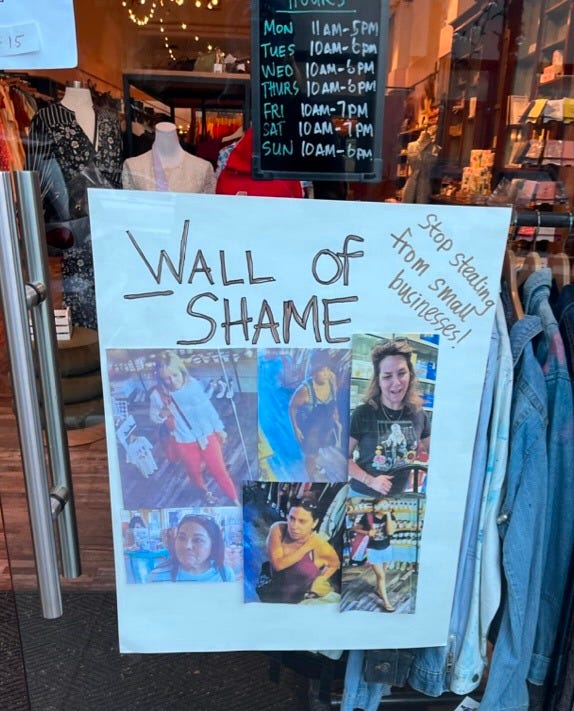#111🚀 My first year in Silicon Valley
👋 Hello Amigos! Dr. Molina here 👨🔧
Hay una versión en español abajo
One year ago, we said goodbye to our friends and family in Madrid at a party, singing “California, Here We Go” to embark on the American adventure. After my first year in Silicon Valley, I want to share some lessons I learned.
The Family Move
It's different when you're an "individual contributor" versus part of a "team." During my trips to the US since 2021, I traveled solo, leaving the "team" (my family) at home. This time, the entire team came along, and that has a logarithmic impact.
The first anecdote showing the shift from being an individual to a team occurred on the second day at the grocery store.
After doing our first family grocery shopping, when I saw the final receipt, my face was a poem. $300 for weekly groceries and basic stuff?
Then my wife looked at me and said:
“But why are you surprised? How is it that you’ve been coming here for over two years and didn’t know what groceries cost?”
Coming here solo is very different because when I went to the store alone, I would just buy coffee, eggs, bread, and oranges—basically breakfast.
We eventually learned to find the products we needed and started looking for a nanny for Marta. Here's the second anecdote. Nannies here are just nannies. Unlike in Spain, where they often help with various tasks, here a nanny focuses solely on the child. And our first nanny focused on Marta… and on going shopping in the Los Gatos neighborhood. The funny part came one Sunday when we were strolling through downtown Los Gatos and saw a sign in a shop window saying: *Please stop shoplifting from local stores,* along with security camera footage catching people in the act. And guess what? There she was, our nanny, with Marta’s stroller in the middle of the screen. That was her last day as our nanny.
Fortunately, ever since then, Marta’s nannies have been amazing.
Work
In parallel, I visited dozens of Frenetic clients throughout Silicon Valley. I logged 34 visits in my first two months. It was crazy. I had to buy a car and travel the valley from San Francisco to San Jose almost daily. Driving here is very pleasant; speeds aren’t high, and there’s plenty of space. When you go back to Spain and drive, you feel like you’re way too close to other cars or buildings.
While visiting companies, I discovered that most people are here to work in Silicon Valley. We’re all expatriates, and we’re all sharing what we’re working on. It’s very unusual not to hear a pitch for a new company at an event or to chat about the latest buzz before it hits Twitter. Because the valley is big, but it’s hyperconnected, and information travels fast. It’s easy to run into the same people repeatedly. Here’s another anecdote: I had a neighbor who smoked weed. One day, I had a meeting at a company, and there was my neighbor—the stoner.
With so many companies and a much higher turnover rate than in Spain (here, two years at a company is the average), mobility is astounding. People switch from Google to a three-person startup, start their own, and then go back all the time. This allows startups to access people who have gone through highly refined processes (and with unlimited resources) and vice versa—people who use technology to compensate for the lack of resources. Most startups without a sales team use AI agents as their salesforce because hiring people is generally expensive and difficult.
In fact, breaking into the job market is very hard if you come from outside because there’s a built-in assumption that what happens here is the best in the world, and the risk of making a mistake is lower with people who have already worked here. It’s complex.
However, the ecosystem is always open to new technologies and willing to hear your story. This is very different from Spain, where hierarchies based on position are practically reversed. The most successful people are open to helping others. It’s part of the valley’s culture. Those who have succeeded want to give back to the community through advice, money, and sharing their experience.
The Strength of the Community
After a year here, I’m beginning to understand the strength of the American community. When I talk about community, I know that in Europe we perceive this concept differently, or at least, we don’t place as much importance on it. In Europe, your first community is your family, which is rarely more than three hours away by car. However, here, communities formed by initially unknown people with a shared purpose or interest are incredibly powerful. Now I understand why Facebook grew so quickly :).
The true American immersion is being part of its communities. People love their country. I’m even starting to get emotional about the national anthem and feel that sense of pride.
And going back to how advanced companies are here, it’s all connected through the culture of these communities.
The engineering, startup, and sales communities… they’re all constantly working on their processes, relentlessly improving everything that already exists. It’s hard to explain, but my experience in Spain with product creation, lean or agile methods—those things were being used here 10 years ago. Everything has already evolved several levels, and above all, it’s not “theoretical” but practical.
More Building, Less Theory
There’s little room for theoretical and reflective strategy in Silicon Valley. Here, people build and test. I’m in love with this. At one company, I invested a modest amount in creating a new product in just two weeks to test if they should pivot their main business. In Spain, that would be the time needed just for product definition. And if you think these products are easy to understand or develop, I have to raise my hand here. The most technically complex products you can imagine have four competitors in the same building. These are things that I sometimes don’t even understand how they manage to sell, given how complex they are.
Many of the things I’m learning are related to communication, building companies with the fewest resources possible, and using technology in any process.
After completing a year in the valley, I consider the basic landing and adaptation phase closed. I’m fortunate to have found phenomenal friends and to see Frenetic’s success in the American market.
For this second season, I hope to continue learning about this culture and country.
If you live in Silicon Valley and want to grab a coffee, I’d love to meet you :).
Thank you for reading. If you like it, you'll help me a lot if you share it with a friend. Thanks!
VERSION EN ESPAÑOL
Hace un año nos despedimos de nuestros amigos y familiares en Madrid en una fiesta cantando “California, there we go” para emprender la aventura americana. Tras una primera temporada en Silicon Valley, voy a tratar de contaros algunos aprendizajes.
La mudanza familiar
Es diferente cuando eres un “individual contributor” o parte de un “equipo”. En mis viajes desde 2021 a USA, los hacía como un individuo viajando, dejando al equipo en casa. En este viaje, el equipo ha venido al completo (la familia), y eso tiene un impacto logarítmico.
La primera anécdota que demuestra el cambio de individuo a equipo ocurrió el segundo día en el supermercado.
Tras ir a hacer una compra familiar, al ver el ticket final, mi cara fue un poema. $300 de compra semanal de comida y cosas básicas?
Entonces mi mujer me miró y me dijo:
Pero porqué te sorprendes, cómo es que llevas viniendo aquí más de dos años y no sabías lo que cuesta la compra?
Y es que ir de individuo es muy diferente, porque cuando iba al super, me limitaba a comprar café, huevos, pan y naranjas. Es decir, el desayuno.
Fuimos aprendiendo a encontrar los productos que necesitábamos y empezamos a buscar una nanny para Marta. Segunda anécdota. Aquí las nannys, sólo son nannys. A diferencia de España, que suelen ayudar a más cosas. Aquí una nanny, se centra en la niña. Y nuestra primera nanny, se centró en la niña y en ir de tiendas por el barrio de Los Gatos. La anécdota viene cuando un domingo paseando por el centro de los gatos, vemos un cartel en una tienda que decía, por favor, dejar de robar en comercios locales, añadiendo fotos de cámaras de seguridad, pillando a personas en el momento del urto. Bien, pues ahí que aparecía nuestra nanny con el carrito de Marta en primera portada. Ese fue el último día de esa nanny.
Por suerte, desde entonces, las nannys de Marta han sido geniales.
El trabajo
En paralelo, yo estaba visitando a decenas de clientes de Frenetic en Silicon Valley. Registré 34 visitas en mis primeros 2 meses. Una locura. Tuve que comprar un coche y recorrer el valle de San Francisco a San José casi a diario. Conducir por aquí es muy agradable, la velocidad no es alta y hay mucho espacio. Cuando vuelves a España y conduces, tienes la sensación de estar demasiado cerca del resto de vehículos o de los edificios.
Visitando compañías, descubrí que en Silicon Valley la gran mayoría de la gente está aquí por y para trabajar. Todos somos expatriados y todos estamos contando lo que hacemos. Es muy raro no escuchar un pitch de una nueva compañía en un evento o charlar sobre el último cotilleo del valle antes que llegue a Twitter. Porque el valle es grande, pero está hiperconectado y la información viaja muy rápido. Es fácil encontrarse con la misma gente, una y otra vez. Otra anécdota; Tenía un vecino que fumaba hierba, un día tuve una reunión en una empresa y allí estaba mi vecino, el fumeta.
Que haya tantas compañías y una rotación super elevada comparada con España (aquí 2 años en una compañía es la media) crea una movilidad de conocimiento brutal. La gente cambia de google a una startup de 3 empleados o a fundar su startup y viceversa, todo el tiempo. Esto permite que las startups tengan acceso a personas que han tenido acceso a formaciones de procesos super refinados (y recursos ilimitados) y al revés, personas que usan la tecnología para resolver la falta de recursos. La mayoría de las startups sin equipo de ventas, usan AI agents como equipo de ventas, porque contratar alguien, en general, es muy caro y dificil.
De hecho, entrar en el ecosistema laboral es muy dificil si vienes de fuera, ya que aquí se da por hecho que lo que aquí ocurre es lo mejor del mundo y con las personas que ya han trabajado aquí el riesgo de equivocarte es menor. Esto es complejo.
Sin embargo, el ecosistema está siempre abierto a nuevas tecnologías, a escuchar tu historia. Esto es muy diferente a España. Las jerarquías de posición están prácticamente invertidas. La gente con más éxito está hiper expuesta a ayudar al resto. Es parte de la cultura del valle. La gente que ha tenido éxito, quiere devolver a la comunidad en forma de consejos, dinero y contar su experiencia.
La fuerza de la comunidad
Tras un año aquí, empiezo a entender la fuerza de la comunidad americana. Cuando hablo de comunidad, se que en Europa entendemos este concepto de forma diferente o al menos, no le damos la importancia que tiene aquí. En Europa, tu primera comunidad es tu familia, que rara vez está a más de 3 horas en coche. Sin embargo, aquí la comunidad que se forma por gente desconocida inicialmente entre ellos, pero con un propósito o interés común, son extremadamente poderosas. Ahora entiendo porqué Facebook creció tan rápido :).
La verdadera inmersión americana es ser parte de sus comunidades. La gente ama el país. Yo mismo estoy empezando a emocinarme con el hinmo y a sentir esa emoción.
Y volviendo a lo avanzado que están las compañías, esto está conectado por las culturas de las comunidades.
Las comunidades de ingeniería, de startups, de ventas… todas están constantemente trabajando en sus procesos, en mejorar lo existente hasta la extenuación. Es difícil de explicar, pero mi experiencia en España en la creación de productos, método lean o ágil, aquí eso se utilizaba hace 10 años, todo ha evolucionado ya varios niveles y sobretodo, no es algo “teórico”, sino práctico.
Más construir y menos teoría
En Silicon Valley hay poco espacio para la estrategia teórica y reflexiva. Aquí se construye y se prueba. Esto me tiene enamorado. Una compañía en la que he invertido un modesto ticket, ha creado un producto nuevo para testear si pivotar su principal negocio en 2 semanas. En España, sería el tiempo de definición del producto. Y si piensas que estos productos son fáciles de entender o de desarrollar, ahí si que tengo que levantar la mano. Los productos técnicos más complejos que puedes imaginar, tienen aquí cuatro competidores en el mismo edificio. Cosas que a veces no entiendo cómo consiguen vender, de lo complejas que son.
Muchas de las cosas que estoy aprendiendo están relacionadas en cómo comunica, cómo crear compañías con los menores recursos posibles y el uso de la tecnología en cualquier proceso.
Tras cumplir un año en el valle, doy por cerrado el aterrizaje y adaptación básico. Tengo la gran suerte de haber encontrado amigos fenomenales y de ver los éxitos de Frenetic en el mercado americano.
Para esta segunda temporada, espero seguir aprendiendo sobre esta cultura y este país.
Si vives en Silicon Valley y quieres tomar un café, me encantará conocerte :), puedes responderme a este emaiol.
Si te ha gustado la NL, me ayudaría mucho si la compartieras con tus amigos, gracias!





